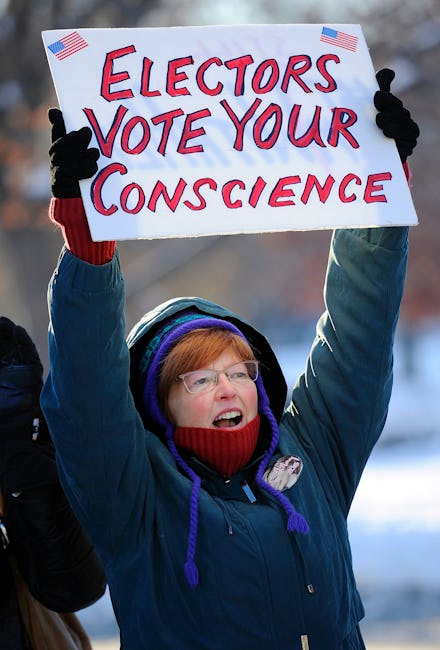How do you become an Electoral College elector? Here's what you need to know.

The 538 electors of the Electoral College are meeting Monday in state capitals across the country to vote on the winner of the 2016 presidential election.
The process is usually a mundane formality, with electors voting for the nominee of the party they've pledged to vote for based on the outcome of the election in their respective state.
But in 2016, President-elect Donald Trump lost the national popular vote by nearly 3 million votes, and there have been allegations of Russian meddling, meaning the usually obscure Electoral College vote is receiving tons of attention this year — with protests and activism aimed at getting the electors to change their votes and stop Trump.
Yet that is extremely unlikely to happen, given who the electors are.
So, who are they? And how did they join this august, suddenly controversial, Constitutionally-mandated body?
What are the requirements to be an elector?
If you want to become an elector, there are just a few criteria, as laid out by the Constitution.
First, each state gets a certain number of electors, determined by the number of members of Congress from their state. For example: New York has 27 members in the House and two senators, giving them 29 electors in the Electoral College. (Washington, D.C., which isn't a state and has no representation in Congress, gets three Electoral College votes thanks to the 23rd Amendment.)
The only criteria for electors is that they cannot be a current senator or House member, nor can they hold "an Office of Trust or Profit under the United States," which prevents current Cabinet members from serving as electors — but past presidents can serve!
How does one become an elector?
Political parties in each state get to determine the process for choosing their slate of electors.
Some states have electors run for the position at party conventions held during the primary process. This year, that has led to some anti-establishment activists becoming members of their state's electoral college.
For example, in Washington state, a supporter of Sen. Bernie Sanders became an elector, and has said he will not vote for Clinton — despite the fact that she won the state's 12 Electoral College votes on Nov. 8.
Other states allow their party leaders to pick their slate of electors, which often leads party stalwarts and insiders, such as party chairs and local elected officials, to become electors.
For example, in New York, where party leaders get to choose their slate of electors, former President Bill Clinton is an elector, according to Politico, and he'll get to cast a ballot for his wife, Hillary Clinton, who won the state's 29 electoral votes.
Electors, however, are only elected if the winner of the popular vote in their state is a member of their party.
So, using New York as an example again, the Democratic slate of electors was elected because Clinton won the state's popular vote over Trump.
Electors are chosen differently in only two states. In Maine and Nebraska, two electors are elected based on the winner of the state's popular vote, and the rest are elected based on who wins each individual congressional district.
In Maine, for example, Clinton only won three of the state's four Electoral College votes, as Trump won the popular vote in the state's second congressional district.
What if electors don't vote for their party's candidate?
It looks like there will be faithless electors this year.
In Maine, Democratic elector David Bright said he'll cast his ballot for Sen. Bernie Sanders, despite the fact that Clinton was slated to win his vote.
In Texas, Republican elector Chris Suprun said he will cast his ballot for Ohio Gov. John Kasich, one of more than one dozen GOP candidates who lost the Republican presidential nomination to Trump.
Some states — 29 to be exact, according to the National Association of Secretaries of State — have laws that bind their electors to voting for their party's candidate.
In Washington State, electors who break that contract receive a $1,000 fine.
But it's unclear whether these rules are constitutional, and therefore enforceable.